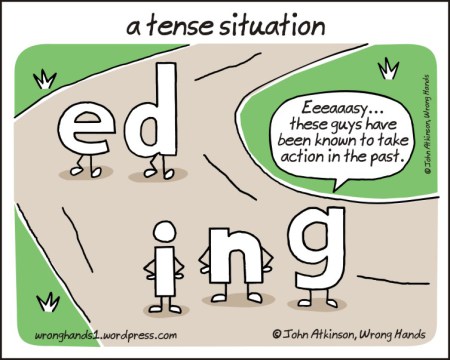|
Today we'll discuss a word and a phrase, either of which would sound fine in a casual exchange but could attract unwanted attention if used in formal writing.
Ahold Although few people would notice anything amiss in a sentence like I wish I could get ahold of a good grammar book, many editors would change get ahold of to either get hold of or get a hold of.
Dictionaries differ on ahold. Back in 1966, Random House's Dictionary of the English Language listed ahold, but called it "informal"—and the American College Dictionary (1968), also from Random House, refused to list the word at all. (Maybe Random House wanted to discourage college kids from using it.)
Nor can ahold be found in the American Heritage dictionary's 1980 edition. However, American Heritage's 2004 and 2011 editions include the word without comment.
A more recent dictionary, Webster's New World (2014), lists ahold but, like Random House half a century ago, labels the word "informal."
Most of the language websites we checked did not recommend ahold. Here are some examples: "Ahold does not exist as a word in standard English." "Ahold poses no problem in informal speech and writing, but it might be considered out of place in more formal contexts." "In standard English you just ‘get hold' of something or somebody."
We found only one website that endorsed this word with any enthusiasm: "Don't hold back on your use of ahold … a word recognized by Merriam-Webster, Garner's Modern American Usage and most other writing authorities."
We confirmed that the Merriam-Webster online dictionary does recognize ahold, but the statement about "most other writing authorities" conflicted with our own findings. And as for Bryan A. Garner's Dictionary of Modern American Usage, all it says about ahold is that "it verges on being standard"—hardly a resounding endorsement.
In close proximity Proximity does not mean "distance"; it means "nearness," so close proximity means "close nearness." Besides its redundancy, in close proximity takes three times as many words and three times as many syllables as are needed to express an elementary concept: nearby.
You see in close proximity all the time, and it always manages to sound ungainly and comically self-important. Here's a small sampling of what we found on the Internet: "The hotel is in close proximity [close] to the corporate, financial and fashionable heart of the city." "Investigators believe the aircraft went down after coming in close proximity [too close] to another plane." "The car's controls are in close proximity [within easy reach]."
Traditional usage guides advise against close proximity. Typical of these is Eric Partridge's Usage and Abusage: "Say close to or near, according to the context." John B. Bremner's Words on Words finds the phrase too obviously silly to get worked up about. Bremner's droll entry under close proximity: "The best kind."
|
View and comment on this
article on our website.
|
|
Free BONUS Quiz for You!
[[firstname]], because you are a subscriber to the newsletter, you get access to one of the Subscribers-Only Quizzes. Click here to take a Who vs. Which vs. That Quiz and get your scores and explanations instantly!
We will be adding many more quizzes this year to our already substantial list of quizzes. If you have suggestions for topics we have not yet covered, please send us a message at help@grammarbook.com.
|
Hundreds of Additional Quizzes
at Your Fingertips
Subscribe now to receive hundreds of additional English usage quizzes not found anywhere else!
Teachers and Employers
Save hours of valuable time! You may assign quizzes to your students and employees and have their scores tallied, organized, and reported to you! Let GrammarBook.com take the hassle out of teaching English!
"Fun to test my skills."
"The explanations really help ... thanks!"
"I can select the quizzes to assign to my students, and then the results are reported to me automatically!"
|

|
Don't need all the quizzes?
You can now purchase the same quizzes individually for ONLY 99¢ each.
Purchase yours here. |
If you think you have found an error in a quiz, please email us at help@grammarbook.com
|
 |
The Blue Book of Grammar and Punctuation
by Jane Straus, Lester Kaufman, and Tom Stern |
The Authority on English Grammar! Eleventh Edition Now Available
An indispensable tool for busy professionals, teachers, students, homeschool families, editors, writers, and proofreaders.
Available in print AND as an e-Book! Over 2,000 copies are purchased every month!
The publisher of The Blue Book, Jossey-Bass, A Wiley brand, is offering a 35 percent discount for those of you who order the book through Wiley.com. Shipping and tax are not included. Simply go to bit.ly/1996hkA and use discount code E9X4A.
Offer expires December 31, 2020.
|
Wordplay

|
 |
English In A Snap:
68 One-Minute English Usage Videos FREE |
Learn all about who and whom, affect and effect, subjects and verbs, adjectives and adverbs, commas, semicolons, quotation marks, and much more by just sitting back and enjoying these easy-to-follow lessons. Tell your colleagues (and boss), children, teachers, and friends. Click here to watch.
|
|





